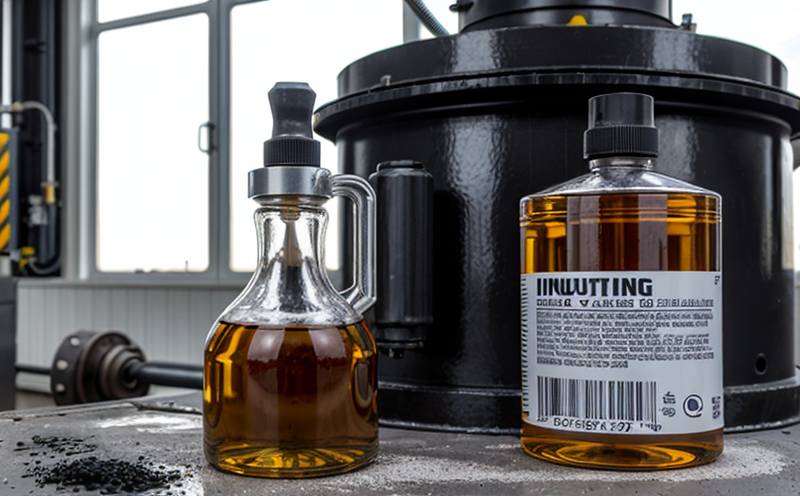UNE EN ISO 12156 Lubricity Testing of Oils
The UNE EN ISO 12156 standard provides a robust framework for assessing the wear resistance and lubricating properties of oils, particularly in industrial applications. This service is crucial for ensuring that lubricants perform optimally under high-stress conditions, thereby extending equipment life and reducing maintenance costs.
UNE EN ISO 12156 defines specific test methods to evaluate the lubricity, or wear resistance of oils in sliding contact. The standard is widely used across various sectors such as automotive manufacturing, aerospace, and heavy machinery industries where lubricants play a critical role in preventing friction-related damage.
The testing process involves subjecting oil samples to controlled conditions that mimic real-world operating environments. This includes applying the sample to a polished steel surface under specified loads and speeds while monitoring wear rates using optical or electronic sensors. The results provide quantitative data on how effectively an oil can protect against metal-on-metal contact, which is vital for maintaining machinery integrity.
Compliance with UNE EN ISO 12156 ensures that lubricants meet stringent quality standards set by international bodies. This not only enhances operational efficiency but also contributes to environmental sustainability by minimizing waste and reducing the need for frequent re-lubrication.
Primary Benefits: By adhering to this standard, manufacturers can confidently demonstrate the reliability of their products in demanding environments. It supports the development of safer, more efficient machinery while fostering trust with customers seeking reliable performance guarantees.
The UNE EN ISO 12156 testing process is designed to be both precise and repeatable, allowing for consistent results across different labs worldwide. This ensures that lubricants perform uniformly under various operating conditions, which is essential for industries reliant on continuous operation without downtime.
For quality managers, compliance officers, R&D engineers, and procurement specialists alike, this service offers invaluable insights into the performance characteristics of lubricants. It facilitates informed decision-making regarding material selection, formulation optimization, and supply chain management.
Scope and Methodology
The scope of UNE EN ISO 12156 encompasses the evaluation of lubricity performance for a variety of oil types commonly used in industrial applications. These include mineral oils, synthetic esters, and blends thereof.
- Test Specimens: Lubricants from different viscosities, grades, and base stocks.
- Testing Equipment: Pin-on-disc testers equipped with sensors for measuring wear rates.
- Standard Operating Procedures: Detailed protocols ensure that each test follows the prescribed procedure to maintain accuracy and consistency.
The methodology involves preparing the lubricant specimen according to the specified requirements of UNE EN ISO 12156. This includes ensuring correct viscosity, temperature control during testing, and adherence to load and speed parameters.
During testing, samples are applied to a polished steel disc held stationary while another disc rotates at controlled speeds and pressures against it. The rotating disc mimics the sliding motion encountered in machinery components. Wear is measured using optical or electronic sensors positioned beneath the discs.
The results generated from these tests provide critical data on the lubricity of the oil sample, including wear rates, which are then compared against established benchmarks to determine compliance with UNE EN ISO 12156 requirements.
Industry Applications
- Aerospace: Ensuring that lubricants used in aircraft engines and hydraulic systems meet high standards of reliability and durability.
- Automotive: Evaluating the performance of engine oils, transmission fluids, and other lubricants under rigorous conditions to enhance vehicle longevity.
- Heavy Machinery: Testing lubricants for use in construction equipment, mining machinery, and other heavy-duty applications where prolonged service life is critical.
- Marine Industry: Assessing the suitability of lubricants used in ship propulsion systems and cargo handling equipment to ensure safe and efficient operations.
In each of these sectors, UNE EN ISO 12156 testing helps manufacturers identify potential issues early on, enabling them to make necessary adjustments to formulations or manufacturing processes. This proactive approach leads to the development of superior lubricants that contribute significantly to operational efficiency and safety.
Environmental and Sustainability Contributions
- Emission Reduction: By improving wear resistance, lubricants can reduce friction in machinery, leading to lower fuel consumption and emissions.
- Resource Efficiency: Better lubrication helps extend the life of equipment, reducing the frequency of replacements and thus conserving natural resources.
- Energy Conservation: Optimized lubrication minimizes energy loss due to friction, contributing to overall energy efficiency in industrial processes.
The use of compliant lubricants also supports broader environmental goals by promoting cleaner production practices. For instance, reducing wear-related waste from machinery can minimize the environmental impact associated with disposal and recycling.
Additionally, compliance with UNE EN ISO 12156 fosters a culture of continuous improvement within manufacturing operations, encouraging the exploration of greener solutions that further enhance sustainability efforts.





